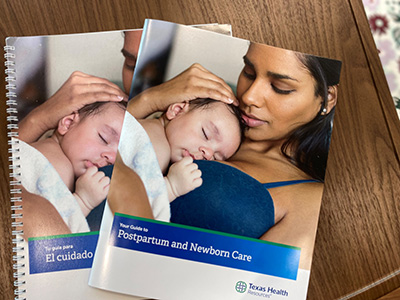ARLINGTON, Texas – When they had their first child, Caleb, at Texas Health Harris Methodist Hospital Alliance in July 2020, Irene and Steven Gallegos were filled with excitement.
“Everyone was just so, so wonderful,” Irene Gallegos said. “We didn’t know what to expect, but we felt very much guided by the entire staff there.”
Light at the End of the Tunnel: One Couple’s Journey with Paternal Perinatal Depression
But not long after arriving home with their new son, Steven Gallegos found himself mentally struggling as he and his wife adjusted to the full weight of responsibilities that come with parenthood. At his darkest moments, he even contemplated suicide as he wondered if his son would be better off without him.
“It’s just really a big heaviness that came upon me. For about a month and half, just battling every day with, ‘Do I want to wake up? Do I want to do this? Do I want to stick around?’” Steven Gallegos said. “It was feelings I couldn’t describe. And then when I told people about them, they’d try to motivate me, but that wasn’t helping.”
The Boyd couple credits a Texas Health Resources book they were given at the hospital, Your Guide to Postpartum and Newborn Care, with helping to save not only their marriage but Steven Gallegos’ life. The guide is distributed to all new mothers at Texas Health hospitals.
“We started looking back through the book, and that’s when she was like, ‘A lot of what you’re going through is right here,’” Steven Gallegos said.
 On Page 45, the book discussed paternal perinatal depression (PPND), a condition experienced, on average, by 8% of men worldwide and 14% in the U.S. The book provided common symptoms of PPND and tips for dealing with it.
On Page 45, the book discussed paternal perinatal depression (PPND), a condition experienced, on average, by 8% of men worldwide and 14% in the U.S. The book provided common symptoms of PPND and tips for dealing with it.
“Now I knew it wasn’t just me; that other men had gone through situations similar to what I was going through,” Steven Gallegos said.
With this newfound knowledge, Steven sought counseling and emerged from the state of cloudiness he was under.
“A lot of focus is understandably placed on maternal perinatal depression, but few people realize that fathers can also struggle with mental health issues after the birth of a baby,” said Dustin Webb, LCSW, administrator at Texas Health Behavioral Health Dallas. “Adapting to having a newborn at home is a major life change that brings many stressors with it. While some may dismiss a change in mood as simply adjusting to life with a newborn or the “baby blues,” if symptoms are severe or last more than a couple of weeks, the affected person should reach out for help.”
The Gallegoses said they wanted to share their story to raise awareness about paternal perinatal depression and hopefully inspire pediatricians to include fathers when screening for postpartum depression.
“Every single person who goes through this matters,” Irene Gallegos said. “We want to encourage them that there is hope, there is light at the end of the tunnel.”
Symptoms of PPND can include:
- Loss of interest in work, like problems with motivation and concentration
- Increased complaints of physical issues, like headaches or weight loss
- Becoming easily stressed and discouraged
- Increased anger, irritability and violent behavior
- Increased use of alcohol and drugs
Free behavioral health assessments are available from Texas Health. You can get more information by visiting our website or calling 682-626-8719.
Related News
About Texas Health Resources
Texas Health Resources is a faith-based, nonprofit health system that cares for more patients in North Texas than any other provider. With a service area that consists of 16 counties and more than 8 million people, the system is committed to providing quality, coordinated care through its Texas Health Physicians Group and 29 hospital locations under the banners of Texas Health Presbyterian, Texas Health Arlington Memorial, Texas Health Harris Methodist and Texas Health Huguley. Texas Health access points and services, ranging from acute-care hospitals and trauma centers to outpatient facilities and home health and preventive services, provide the full continuum of care for all stages of life. The system has more than 4,400 licensed hospital beds, 6,400 physicians with active staff privileges and nearly 29,000 employees. For more information about Texas Health, call 1-877-THR-WELL, or visit www.TexasHealth.org.
